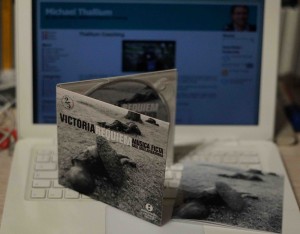“It is a mystery to me what strange, secret codes enable a man, dead for centuries, to communicate with absolute clarity his most profound life experiences to successive generations. I suppose that therein, ultimately, lies the greatness of Art.” Raúl Mallavibarrena (Oviedo, Spain, 1970)
 The Empress Maria of Austria, the eldest daughter of Emperor Charles V and Isabella of Portugal, died at the Monastery of Las Descalzas Reales in Madrid in 1603 after spending half of her life abroad, giving birth to 15 children and years of quarreling with the most corrupted man in Castille, the 1st Duke of Lerma. Maria had been born 75 years earlier at the Royal Alcazar of Madrid, which would disappear two centuries later in a devastating fire in 1734. Interestingly, composer Domenico Scarlatti would be a first-hand witness of that fire. The present Royal Palace of Madrid is erected upon the former Alcazar.
The Empress Maria of Austria, the eldest daughter of Emperor Charles V and Isabella of Portugal, died at the Monastery of Las Descalzas Reales in Madrid in 1603 after spending half of her life abroad, giving birth to 15 children and years of quarreling with the most corrupted man in Castille, the 1st Duke of Lerma. Maria had been born 75 years earlier at the Royal Alcazar of Madrid, which would disappear two centuries later in a devastating fire in 1734. Interestingly, composer Domenico Scarlatti would be a first-hand witness of that fire. The present Royal Palace of Madrid is erected upon the former Alcazar.
The retirement of Maria of Austria at Las Descalzas Reales was accompanied by the music of the Avila born Tomas Luis de Victoria (1548-1611). Victoria was a chaplain of Las Descalzas from 1586 until the empress’s death. It was here that Tomas Luis de Victoria wrote his Officium Defunctorum, the famous requiem in memory of the empress who had been a patroness of arts and of Victoria’s music for many years. This requiem might not be the last work Victoria wrote, but it is indeed the last he published in 1605, two years after Maria of Austria’s death. To the relevant parts of the Missa pro Defunctis, Victoria adds a Lectio for four voices on a text of Job, Versa est in luctum, and the responsory Libera me.
The Officium Defunctorum is a work that has been recorded and performed by numerous vocal ensembles and, certainly, the greatness of this music lies in all those profound life experiences Victoria is able to communicate to everyone who has ears to listen to them. Not in vain, it has been more than four centuries since Tomas Luis de Victoria wrote this masterpiece and it is, still today, a testimony of remote times, times that may sound strange to most people of the 21st century.
In 2017, for their 25th anniversary, the vocal ensemble Musica Ficta recorded a new version of this requiem of Victoria for the record label Enchiriadis. It is the sencond recording of the same work after the one they made back in 2002. Why “another” new version? Raul Mallavibarrena, conductor of Musica Ficta, says it his aim to make music as he would like to hear it at any given moment, championing the heritage of yesterday. It seems that the version of 2002 was without a doubt a successful recording, both commercially and personally, a winner of awards and with a sales record far superior to that of any of the Enchiriadis label. Mallavibarrena’s interpretative approach, back then, was to present “Victoria at his most unrelenting, austere, driven by the dark pessimism of the text and impelled by the dejection of its almost abyssal music, seemingly spewed from the very mouth of the end of all days and all things”.
I had the chance to listen to both versions and I would like to share my opinion here. I do it for those all people profane in early music —the “initiated” ones, probably, will not stop and read yet “another” opinion about “another” umpteenth version—, because I would like to contribute to the dissemination of this music. I will not speak in terms of better or worse, good or bad. I’d rather speak of “preferences”, and it is clear to me that the version I connect the most with is the requiem of 2017. The reading of 2002 sounds more “ceremonial” to me. Actually, the voices are accompanied by an organ and a dulcian —a woodwind Renaissance instrument, a predecessor of modern bassoon, used to accompany plain chant. I have nothing against “ceremonial” things. However, it seems to me that the reading of 2017 is closer, less strange, simpler —no instruments as accompaniment—, less “liturgical” —although still being religious music—. I could choose only one of the two readings, I would go for the 2017 requiem. Raul Mallavibarrena is likely to have found an interested listener in me, interested in his new reading. And that may be a payoff for him, moreover if my words will make somebody else to open their ears to new music and buy Musica Ficta’s record.
Yes! Yet another time: Victoria’s Requiem… Ultimately, the greatness of Art!
Michael Thallium
Global & Greatness Coach
Book your coaching here
You can also find me and connect with me on:
Facebook Michael Thallium and Twitter Michael Thallium
